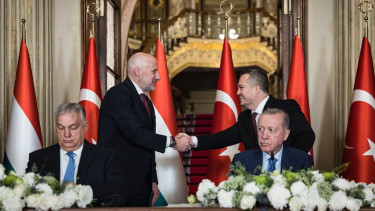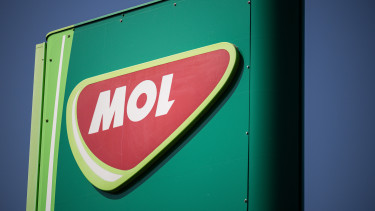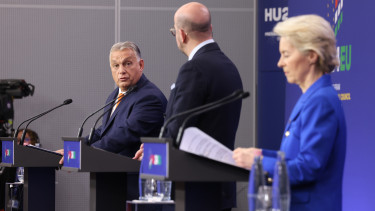What would happen to Hungary's Mol if Russian oil stopped flowing?

Asked about the current sources, routes and types of oil that Mol is procuring, Huff replied:
- Mol Group processes an average of 14-15 million tonnes of oil per year, of which roughly
- 9 million tonnes are Russian oil from the Friendship pipeline,
- 1 million tonnes from Hungarian and Croatian production, and
- the rest from offshore oil from the Adriatic.
Of the oil coming from the sea, roughly 3 million tonnes is processed locally in Rijeka and 1.5-2 million is transported via the Adriatic pipeline to the refineries in Százhalombatta and Bratislava.
- The Rijeka refinery processes up to 100% Mediterranean oils,
- the Százhalombatta refinery can currently process up to 30-35% of non-Russian oil in various blending proportions, while
- only around 5% of oil processes at the Bratislava refinery can come from other than Russian sources. Currently, 100% of the oil it processes is from Russia.
In Százhalombatta the Russian-to-maritime oil ratio is 80 to 20%, and for the whole year Mol has targeted the share of the latter at 30%.
Asked how far these proportions can be shifted, Huff replied that in Bratislava, 30% offshore processing is a theoretical possibility, but there are currently a number of technical obstacles that may be overcome through various developments. In Százhalombatta, the experience gained and developments carried out over the last eight years helped reached 30-35%.
Huff also said that 100% of Russian crude is delivered through the Friendship (Druzhba) pipeline, although maritime transport is also a possibility, but Mol has not processed much Russian oil of maritime origin in Százhalombatta; there was no need for that.
It is very important that we do not only need to move oil for refinery activities, but there is also a fairly significant strategic stock in Hungary, the logistics, storage, exchange and upgrading of which must also be managed,
he said.
The price difference between the two types of oil, Brent and Ural, has become wide, but Huff stressed the key driver of Mol’s purchases has been the security of supply rather than price differentials.
He noted that Mol Group boasts an oil storage capacity of nearly 700,000 tonnes, in Croatia, Hungary and Slovakia.
Mol buys about the same amount of oil from Russia than the average of previous years. This year’s target is around nine million tonnes of Russian Export Blend (REB),
said Huff.
Asked what alternative routes could be considered, and what type and volume of oil could Mol procure, Huff replied that Mol has two main and one secondary supply routes for oil supply: (i) the Friendship and (ii) the Adriatic pipelines supply 85-91% of Mol refineries in Százhalombatta and Bratislava with oil, and (iii) domestic production, which is about 10 to 15% of the total volume (these crudes are typically used for lubricant production).
During the periods when both refineries have to operate at maximum capacity, about 1,100 kilotonnes/month would need to be transported via the Adriatic pipeline if the Friendship pipeline shut down.
“Due to the limitations of some sections of the pipeline, we currently have a delivery capacity of 900 kilotonnes per month," he said.
From a risk management point of view, if something were to happen tomorrow, this is enough capacity to ensure immediate uninterrupted supply, but it does not mean sustainable security of supply.
"Therefore, significant maintenance and development work still needs to be done,” he added.
Asked about how much costlier transport via the Adriatic pipeline would be Huff noted that – partly due to logistics issues – maritime transport is always more expensive. Although there are many analyses out there, Huff said
it is difficult to estimate what would happen if two million barrels of REB vanished from the market overnight.
In peak periods, therefore, the Adriatic cannot fully replace the capacity of the Friendship. When asked if it is technically a problem if the refineries are not operating at previous capacity, Huff replied that although there is an increase in unit costs, as the refineries produce smaller volumes at a fixed base cost, there is flexibility in the technologies, typically between 75-100% capacity.
With this flexibility, we can handle 900 kilotonnes of oil per month,
he added.
How long would it take and what would be the approximate cost of shifting these ratios?
This is very difficult to estimate. At the moment, the operating principle is that we have a very strong base, which is Russian oil, 70-80% of which is in our refinery, and then we add other offshore oils.
The REB oil is an export blend of oil from nearly 60 oil fields across the Urals, blended in a huge terminal with a storage capacity of over a million tonnes and the right technical background. It is a blended product of very stable quality, with little change in quality over the last 10 years. This ensures that our refineries can operate with predictable stability.
When we talk about how quickly we can replace this, it is the operating model that needs to change. We are evaluating what are the low-risk and marketable types of crude oil that we can replace such a REB type with, but given the nature of crude oil and our technology, this is not a simple technical problem.
For example, take Arab Light, which is very similar to Russian, slightly higher sulphur content, but very close in yield structure to Russian, so we can produce about the same amount of diesel, gasoline and chemical products. However, there is one parameter, the sulphur content of a particular fraction, which is way above the permissible value, and this makes it impossible for our diesel production unit to operate. It follows that, although the oil is suitable on the basis of the basic parameter, when examined in detail, we cannot process it cleanly in our technological system.
We make a detailed report on every single oil and blend, which adds up to several hundred. There are parameters due to which we have to reject a particular type of oil because the technology cannot handle it. We have more than 100 analyses at the moment. Unfortunately, it is not as simple as picking two oils that look good, as we have to analyse more than 40 parameters.
In addition, it is essential that the types to be blended are compatible. For example, in offshore oils, there are some that are very naphthenic, a lot of components that tend to resinify and a lot of paraffinic. If you mix these together, one of them will precipitate, causing blockages in the system.
So the primary task would be for Mol to find an oil on the market that is similar to the Urals?
Yes, and there are such types.
If the REB were to shut down tomorrow, we could continue to operate, but with significantly less capacity, and a lot of downtime and potential damage, resulting in significantly less diesel and other products in an already product-scarce market.
Moreover, there is a big question as to how sustainable this is. We know the physical constraints. It took us nearly eight years to get to the point where we can process 35% offshore oil in Százhalombatta. It's not because we didn't think about it or didn't understand it, but part of it is calculation, physics and chemistry, and part of it is experience. You have to find out whether what works in the lab and on paper works in the million-tonne apparatus.
It is important to note that what we set out to do was a partial processing of marine oil, and we optimised our own system for that. If we now need a supply based entirely on non-Russian oil, that can be done, but to make it reliable in the long term and not be in the press in a year's time saying that the Százhalombatta [refinery] has stopped because it is punctured, it is blocked, etc., requires much more caution.
It is worth looking at the refineries that are connected to the Friendship pipeline in the region, those in Hungary, Slovakia, Poland and Germany. Each has a very different level of maturity and a different supply situation. If one German refinery goes out of business because it can't switch overnight from Russian oil to another, there are dozens of other refineries that will supply the market.
There is only one refinery in Hungary.
The commercial activity itself, the availability of our products is much more limited than in those markets.
Another important aspect is that we also make other products besides diesel and petrol. And obviously consumers would not be happy if tomorrow they could not take off with any airline because the kerosene we deliver is not of good quality, or there is no car gas, or even bitumen of the right quality.
What would it mean in terms of time and cost to switch to Arab Light, a product that is very similar to Russian oil but differs from it in, say, one important parameter?
As I mentioned, since it cannot be processed in itself, we first need to find the right modifying oil to add to the Arab Light to ensure production. Then we need to be able to procure these crude oils and transport them to our refineries. Now that the Danube Refinery is processing 35% marine oil, it needs to receive a marine shipment every two weeks, which has to be unloaded and transported via the Adriatic pipeline. If we want to switch to 100%, we would need to have a ship docking every two days in Croatia, unloading, pumping and we would need to build blending and storage capacity. We calculate that
at least two to four years are needed for us to say we can sustainably provide long-term security of supply at the REB risk level. All of this, of course, requires planning, development and investment in the hundreds of millions of dollars.
Huff highlighted that security of supply also means that even if the refinery is successfully converted to a different type of oil, the output will be different, which is a possibility for both diesel and gasoline.
"Even if it all works out, it would be much more expensive, but in the end there would be less diesel on the Hungarian market, creating a security of supply risk," he said.
Huff warned that switching a refinery to another type of crude is “not like a stock market analysis, which, if it doesn't work, nothing really happens.”
There are serious financial, environmental and safety consequences to every decision here. After all, we are talking about processing many thousands of tonnes of oil burning at hundreds of degrees. This is not a game.
When asked if there is any business reality to building a brand new refinery, Huff replied that there’s certainly not on a market basis.
Roughly estimated, building a small refinery would cost USD 7-10 billion and take 5-8 years, he said, adding that the last refinery in Europe was built in 1997. Not to mention that in the fight against climate change, we are just about to reduce the amount of fossil fuels, so “this is not the direction the world is going in.”
Cover photo: Mol











